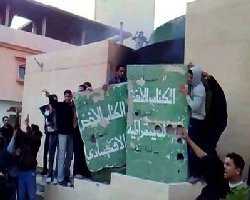Libyan security forces have reportedly opened fire at a funeral in the eastern city of Benghazi, killing at least 15 people and injuring scores more as protests against Muammar Gaddafi, the country's long-time ruler, continued.
The victims on Saturday were mourning the loss of protesters who had been killed during anti-government demonstrations in the city during the past week, witnesses said, bringing the death toll to more than 100 in six days of unrest, according to opposition groups.
Dr. Mariam, speaking from a hospital in Benghazi, told Al Jazeera that, "It's a massacre here. The military is shooting at all the protesters with live bullets, I've seen it happen with my own eyes. The military forces are everywhere, even from the hospital I work, we are not safe. There was an 8-year-old boy who died the other day from a gunshot to the head - what did he do to deserve this?"
Ahmed, a Benghazi resident, said: "Right now, the situation is even worse than earlier today. Shooting is going on until now. And at a nearby hospital, at least 150 people have been admitted, those injured and dead. As far as [reports of] African mercenaries being seen in Benghazi, I have not seen any, but the military is all over the place."
Another doctor from Benghazi told us earlier the Al Jalah hospital where he works had received 15 bodies and was treating numerous people following the shootings at the funeral.
He said the hospital had counted 44 deaths in total in three days, adding that it was struggling to treat the wounded.
"This is not a well-equipped hospital and these injuries come in waves. All are very serious injuries, involving the head, the chest and the abdomen. They are bullet injuries from high-velocity rifles.
"All are civilians aged from 13 to 35, no police or military injuries," he said, adding that there was no way the wounds could have come from anyone other than security forces.
"Absolutely a shoot-to-kill policy," he said.
Hospitals 'overwhelmed'
The deaths came amid claims that a military brigade in Benghazi had fallen to the people. The doctor in Benghazi told Al Jazeera that protesters stormed the building on Saturday.
The violence came after Human Rights Watch said earlier on Saturday that 84 people had died over the past three days.
Ahmed, a businessman and resident of Benghazi who declined to give his real name for his own safety, told Al Jazeera that hospitals in the city were overwhelmed with the number of dead and injured and were running out of blood.
"It's a big, big massacre. We've never heard of anything like this before. It's horrible," he said.
"The shooting is still taking place right now. We're about 3km away from it, and we saw this morning army troops coming into the city. You can hear the shooting now. They don't care about us."
Unrest 'spreading'
The unrest in Libya has largely been centered in the eastern cities of Benghazi, Bayda and Tobruk. But Al Jazeera has received reports that the protests have begun to spread to the country's west.
Witnesses said thousands of people took part in peaceful protests in the western city of Misurata. They were demonstrating against state brutality, rather than calling for a change in government.
Mohamed Abdulmalek, the chairman of Libya Watch - a human rights group that monitors abuses within the country - said the delay of protests in the west was due to the heavy presence of security forces there.
"The delay in the uprising in the west was not because the people did not want to go out," he told Al Jazeera from the UK.
"But the security presence in Tripoli, for example, was so intense that people gathered individually in the beginning. The Libyan regime anticipated this so the squares in Tripoli were occupied by security forces and therefore people were not allowed to gather.
"But eventually, the pressure on the capital started from outside Tripoli and now you see the people revolting. We have no doubt that the east and the west will unite."
Verifying news from Libya has been difficult since the protests began, due to restrictions on journalists entering the country, as well as internet and mobile phone blackouts imposed by the government.
The Libyan government has blocked Al Jazeera's TV signal in the country and people have also reported that the network's website is inaccessible from there.
Internet cut
The internet service has also been cut off, according to a US company that monitors Internet traffic.
Massachusetts-based Arbor Networks said data collected from 30 Internet providers around the world showed that online traffic in and out of Libya was disconnected abruptly at 0015 GMT on Saturday.
The data also showed two partial service interruptions earlier in the day. It was unclear if service was still unavailable.
Protests in the country began on February 14, and three days later tens of thousands of anti-government demonstrators seeking to oust Gaddafi took to the streets in what organizers called a "day of rage" modeled after similar protests in Tunisia and Egypt that ousted longtime leaders there.
Gaddafi has ruled Libya since 1969.
While Libya has the largest oil reserves in Africa, two-thirds of the 6.5 million strong population live on less than $2 a day.
PHOTO CAPTION
Image taken from an undated video released on YouTube allegedly shows anti-Kadhafi demonstrators destroying a monument in the Libyan city of Tobruk on February 17.
Al-Jazeera


 Home
Home Discover Islam
Discover Islam Quran Recitations
Quran Recitations Lectures
Lectures
 Fatwa
Fatwa Articles
Articles Fiqh
Fiqh E-Books
E-Books Boys & Girls
Boys & Girls  Ramadan
Ramadan Fatwa Audios
Fatwa Audios Month of Mercy
Month of Mercy Women
Women Eed Al- Fitr
Eed Al- Fitr Food Recipes
Food Recipes Videos
Videos

 Prayer Times
Prayer Times












